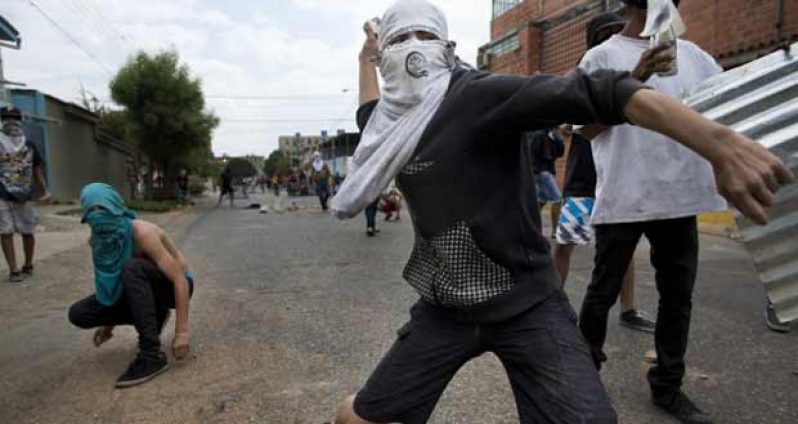–recollections of anti-Aristide coup
IT WAS inevitable that as the political crisis situation worsened in Venezuela, the government of President Nicolas Maduro, which feels threatened by external interference, would have identified the United States of America with involvement.

At the time of writing, the US State Department was yet to respond to President Maduro’s public plea late last week for “high level dialogue” between the governments in Washington and Caracas.

But the Georgetown-based Caribbean Community, though aware of its limited clout, has commendably led the way among regional and hemispheric-wide organisations in denouncing the spreading political violence in Venezuela, and urging all parties to return the country to ‘peace and calm’.
Significantly, this call by CARICOM on February 18 came amid growing concerns over foreign interventions, and with Defence Ministers of the 12-nation Union of South American States (UNASUR) warning against any such development.
For its part, Guyana, which has a colonial-inherited problem with Venezuela’s claim to some two-thirds of this nation’s 83,000 square miles of sovereign territory, was the first CARICOM member state to denounce the violence, and urge peaceful dialogue in the national interest of the Venezuelan people.
The political turmoil, now in its third week and primarily located within the ranks of the opposition party of Leopoldo Lopez, wants to see the back of the socialist-oriented Bolivarian government of President Nicolas Maduro, first choice of his late mentor, Hugo Chavez.
Last year, Maduro led his party in retaining the presidency, though by a narrow margin. Subsequently, he was to convincingly win, against the odds, local government elections. Yet, an assurance signalled in 2013 by US Secretary of State, John Kerry, after Maduro’s presidential triumph, for improved Washington’s relations with the government in Caracas remains elusive.
Worse, amid the current widening protests, President Maduro’s administration was to openly link US-backed involvement and sent packing three officials of the United States embassy in Caracas for claimed subversive activities.
That development drew a sharp response from Mr. Kerry, who called on President Maduro’s administration to “step back from its efforts to stifle dissent through force, and to respect basic human rights…”
Already there have been reports of at least 50 (fifty) known deaths, and scores of injured during recurring street protests between thousands of rival anti and pro-government demonstrators. But the US government, known for its dislike of the administration in Caracas, is yet to signal any serious interest in bilateral talks.
The BBC’s Latin America and Caribbean service has reported Maduro as urging President Barack Obama for Washington and Caracas to engage in “high-level dialogue” at which, he said, “the truth will be put on the table…”
He also stressed that the dialogue “will be difficult and complex, until the US government accepted the full autonomy and independence of Latin America…”
For his part, Carl Meacham, director of the Americas Programme at the Centre for Strategic and International Studies, in analysing the bloody confrontations beyond Caracas, has questioned whether the Obama administration “is turning a blind eye to chaos in Venezuela…”
CARICOM government leaders, diplomats and top officials familiar with Washington’s involvement under then President George W Bush in orchestrating a 2004 coup against the democratically-elected President of Haiti, Jean-Bertrand Aristide, would appreciate the current principled stand by the 15-member Community in moving, with alacrity, to denounce the spreading violent confrontations in Venezuela, and appealing for “a return to peace and calm…”
The critics of CARICOM may cynically question the political clout of the regional economic integration movement in rushing to make the appeal for an end to violent confrontations with the very relevant observation that “no democratic society can reasonably pursue disorder, or any unwarranted subversion of democratic institutions…”
Haiti’s 2004 coup
After all, those not suffering from expedient political amnesia, could well recall CARICOM’s strenuous efforts to dissuade foreign political interferences in fomenting widespread disturbances, including murder, designed to oust President Aristide from power.
The former Prime Minister of Jamaica, P J Patterson, then Chairman of the Community, as well as Edwin Carrington, then Secretary-General, can hardly forget how efforts were frustrated by foreign governments — those of the USA and France in particular — determined to oust from power the democratically-elected Aristide.
Documentation of complicity in the coup against Aristide would include how he was influenced into signing the ‘letter of resignation’, prior to being placed, along with his family, under armed escort on a military aircraft and flown into exile via, ironically, Jamaica, and ultimately to South Africa.
But to return to the present dangerous political scenarios in Venezuela, which — as happened in Haiti to President Aristide’s democratically elected government that the then Bush administration strongly disliked — now faces a serious survival threat involving foreign interference.
President Obama’s administration is yet to signal any serious interest in dialogue with President Maduro’s government.
While awaiting other hemispheric bodies and governments to speak up in support of political sovereignty and respect for democratically-elected administrations, let it be noted that CARICOM, our comparatively small regional economic integration movement, has done what’s politically correct in taking a principled stand on the current situation in Venezuela.
This early stand by CARICOM should not be wrongly confused with preferential financial benefits member states derive from the concessions provided by Venezuela’s fraternal arrangements under the Hugo Chavez-inaugurated Petro Caribe project that’s currently being endangered by the prevailing domestic political problems.
Objectively, it could well be viewed as a small but very principled stand by CARICOM in favour of the preservation of political and territorial sovereignty, as well as democratic governance.
There should be no repeat in Venezuela of what happened in 2004 to the democratically-elected government of President Bertrand Aristide.
(Analysis by Rickey Singh)




.png)









